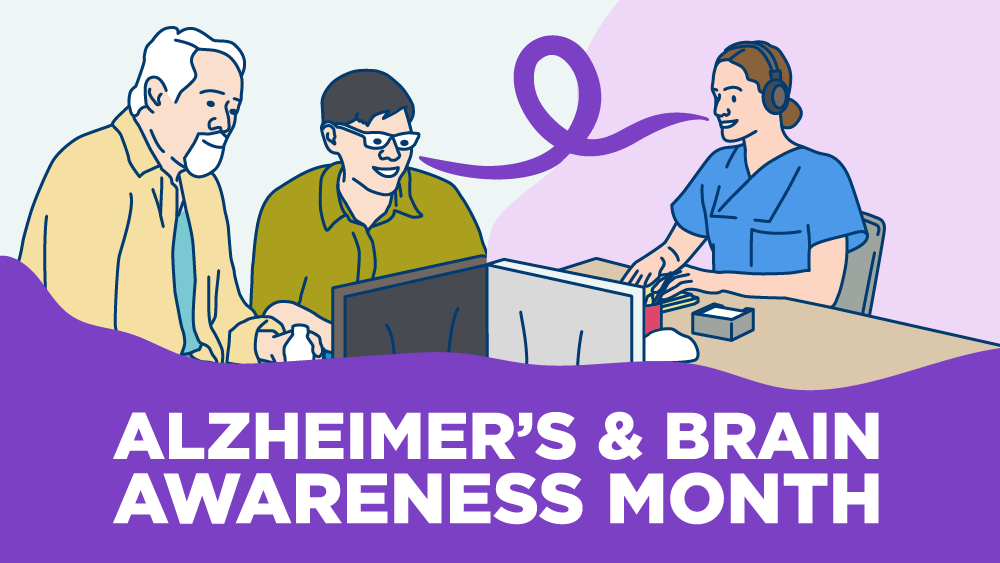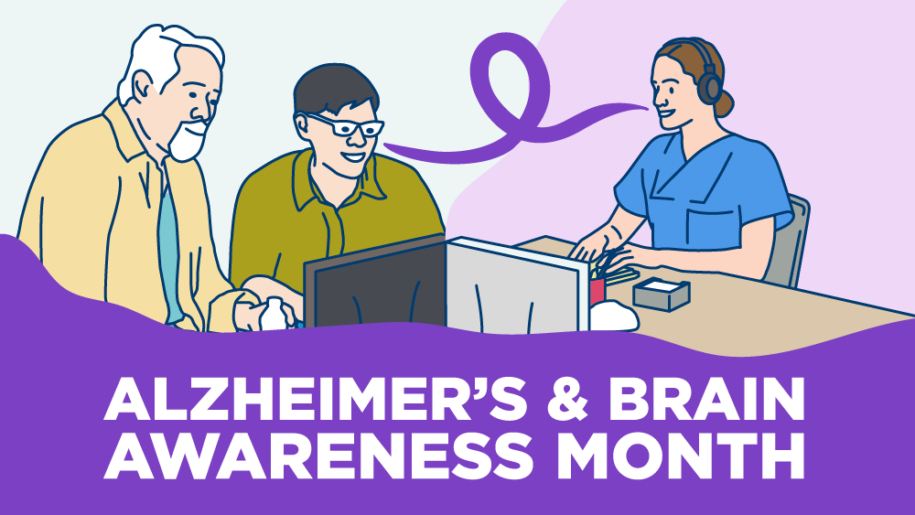
Recognize Alzheimer’s and Brain Awareness Month This June
June is Alzheimer’s and Brain Awareness Month in America and beyond. It’s a time to call attention to brain-related illnesses and injuries, as well as their causes, treatments, and prevention based on the latest research.
Brain-based diseases have no racial, class, or social limitations. We’re all susceptible to conditions like dementia and the potential to develop disorders as we age [1]. Despite the risks of neurological disorders as we get older, there are steps you can take to reduce your chances of developing such conditions.
In observance of Alzheimer’s and Brain Awareness Month, our dedicated network of nurses is shedding light on some common brain illnesses and precautions you can take to protect against them.
Background on Brain-Related Illnesses
From storing your memories to steering your movements, your brain performs a wide variety of essential functions. In fact, your brain never truly stops running and constantly uses around 20% of your metabolic energy—even when you’re resting or asleep [2].
Entrusted with such heavy responsibilities, brains are truly the command centers of our bodies. Unfortunately, these heavy burdens can take their toll and result in neurological disorders as we age. In the United States alone: [3]
- Over 6 million people are currently diagnosed with dementia-related conditions such as Alzheimer’s
- $345 billion is forecasted to be spent treating Alzheimer’s in 2023
- An additional (estimated) $339.5 billion of unpaid dementia caregiving was provided by patients’ relatives and associates in 2022
Brain-related issues cost the healthcare system and patients’ families exorbitantly. As such, individuals who are suffering from brain issues, and their families, often wonder how to heal appropriately.
While there is no single cure for such issues, there are effective treatments and preventative measures anyone can take to help safeguard against brain conditions as you age.
How to Bolster Brain Health in Your Daily Life
Our brains are living, thinking organs. Like our hearts, stomachs, and other parts of our bodies, they need to be taken care of to function optimally and maintain their health. Yet despite controlling and communicating for our bodies, we often don’t recognize our brain’s distress signals as clearly as we do those of other organs. It’s rare to feel brain pains, but we all know the sensation of elevated heart rates and queasy stomachs.
Thus, it’s best to monitor and maintain our brain health proactively, rather than read and react to any arising issues. While family history, age, and genetics are set in stone, other contributing factors can be controlled and curtailed. To support your brain as you age, try:
- Getting enough sleep – As mentioned, the brain never fully shuts down. It does, however, recharge and rejuvenate with slumber. Recent studies have revealed a potential link between sleep in middle age and people’s propensity to develop dementia. Individuals who slept six hours or less per night in their 50s and 60s are up to 30% more likely to deal with such issues than those who slept seven or more hours [4].
- Staying active – We all know that running laps and lifting weights benefits us physically, but you may not realize how beneficial exercise is for our neurological health. One study found that aging adults who remain active are half as likely to develop dementia as their sedentary counterparts. To maximize exercise’s benefits, perform 150 minutes of moderately intense, or 75 minutes of vigorous, activity per week [5].
- Forgoing smoking and alcohol – The harmful health effects of tobacco and alcohol are well-documented, so it’s no surprise to see these two common culprits on this list. One study found that excessive consumption of these substances can cause aging adults to experience cognitive decline 36% faster than non-smoking, moderate drinkers [6].
Despite taking these precautions, brain disorders can affect anyone as they grow older. Over 10% of people over 65 develop Alzheimer’s and may require persistent care to continue living their lives [7].
Monitoring and Treatment for Brain-Related Illnesses
Neurological disorders are most common in those aged 65 and above. They can, however, develop in younger adults—in which case, they’d be considered early onset. For Alzheimer’s, some of the primary early warning signs to watch out for include: [8]
- Memory loss and trouble recalling core knowledge
- Difficulty completing familiar tasks and solving problems
- Mental confusion and communication issues
- Misplacing things consistently
- Mood changes, poor judgment, and self-isolation
Patients who receive an Alzheimer’s diagnosis have a variety of medications and treatments available to help manage their conditions. Nevertheless, there’s ultimately no cure for Alzheimer’s. As conditions progress, patients will need an increasing amount of personal treatment and care to help them safely and happily live their lives.
Signallamp Health Provides Compassionate Care to Patients with Brain-Related Illnesses
Alzheimer’s patients and those dealing with other neurological issues encounter many challenges as they strive to live their lives to the fullest. They don’t, however, have to face them alone.
The compassionate nurses at Signallamp Health specialize in Chronic Care Management (CCM) for ongoing conditions such as Alzheimer’s. Every case of brain-related illness is different and difficult. Thus, our caregivers prioritize patience, attentiveness, and understanding in dealing with patients.
Signallamp Health helps alleviate the financial and mental burdens patients’ families experience. We work directly with healthcare providers and primary caregivers to ensure our patients receive affordable, customized care. If your patients have been diagnosed with any brain-related illnesses, consider a CCM plan from Signallamp Health to help maintain a higher quality of life for them.
Sources:
[1] “The Truth About Aging and Dementia.” Centers for Disease Control and Prevention. September 8, 2021. [Online] Available: https://cdc.gov/. [Accessed June 19, 2023]
[2] “Energy demands limit our brains’ information processing capacity.” University College London. August 3, 2020. [Online] Available: https://www.ucl.ac.uk/. [Accessed June 19, 2023]
[3] “2023 Alzheimer’s disease facts and figures.” Alzheimer’s Association. April 19, 2023. [Online] Available: https://pubmed.ncbi.nlm.nih.gov/. [Accessed June 19, 2023]
[4] “Lack of sleep in middle age may increase dementia risk.” National Institute of Health. April 27, 2021. [Online] Available: https://www.nih.gov/. [Accessed June 19, 2023]
[5] “Physical Activity Boosts Brain Health.” Centers for Disease Control and Prevention. February 24, 2023. [Online] Available: https://cdc.gov/. [Accessed June 19, 2023]
[6] “Combined impact of smoking and heavy alcohol use on cognitive decline in early old age: Whitehall II prospective cohort study.” The British Journal of Psychiatry. August 2013. [Online] Available: https://www.ncbi.nlm.nih.gov/. [Accessed June 19, 2023]
[7] “Alzheimer’s Disease Facts and Figures.” Alzheimer’s Association. [Online] Available: https://www.alz.org/. [Accessed June 19, 2023]
[8] “10 Warning Signs of Alzheimer’s.” Centers for Disease Control and Prevention. December 13, 2019. [Online] Available: https://cdc.gov/. [Accessed June 19, 2023]

